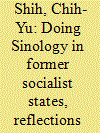|
|
|
Sort Order |
|
|
|
Items / Page
|
|
|
|
|
|
|
| Srl | Item |
| 1 |
ID:
135420


|
|
|
|
|
| Summary/Abstract |
This article presents the beginnings and early development of sinology in Czechoslovakia, from 1945 when it was first established as an inde pendent academic discipline at Charles University in Prague to 1959 when the Sino-Soviet split occurred. During this period, the foundation for what later has become known as the "Prague School" of sinology was established, with Jaroslav Prûsek (1906-80) as the central figure. Using interviews with former students of Jaroslav Prûsek, along with written sources, such as the popular journal Novy Orient (est. 1945), prefaces and postscripts to Czech translations of Chinese literature, and popular books about China published in Czech, the article demonstrates how popularization, together with academic research, played an impor tant role in Czechoslovak sinology. The sources also reveal a signifi cant persistence of an idealized picture of Chinese culture during World War II that was shared by Czech sinologists of the period with Czech artists and the general public. Following the Communist victory in China, the romantic vision of Chinese culture did not diminish; instead it became fused with the shared ideals of communism.
|
|
|
|
|
|
|
|
|
|
|
|
|
|
|
|
| 2 |
ID:
135419


|
|
|
|
|
| Summary/Abstract |
The study of China in each of the former socialist states has a long tradition in the humanities. Before the socialist period, the philological tradition was based largely on the legacy of French sinology. During the
socialist period, China Studies adopted scientific principles in accordance with Marxist perspectives, but these were primarily superimposed without any intellectual roots among sinologists. Such was the case in
Czechoslovakia, Mongolia, Poland, Russia, Vietnam, and the other socialist environments. The humanities were considered part of scientific research, thus making for a situation quite different from that in Western, primarily American, institutions of higher education, where the social sciences and the humanities were two different kinds of basic research, with their own epistemological assumptions and methodological approaches.
|
|
|
|
|
|
|
|
|
|
|
|
|
|
|
|
| 3 |
ID:
134465


|
|
|
|
|
| Summary/Abstract |
In this article, I describe Karl Deutsch’s personal and political background and career and offer an assessment of him as a scholar, teacher, and mentor.
|
|
|
|
|
|
|
|
|
|
|
|
|
|
|
|
|
|
|
|
|